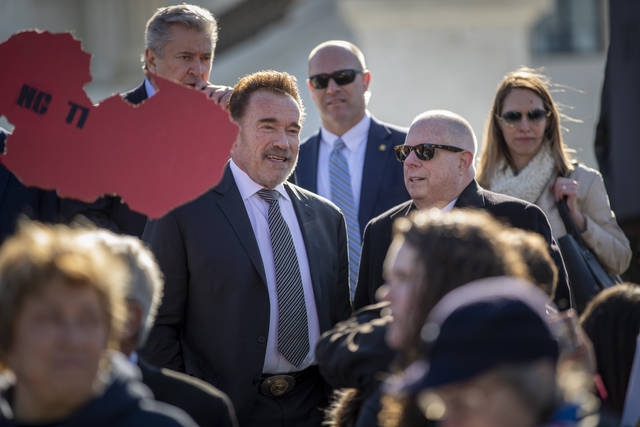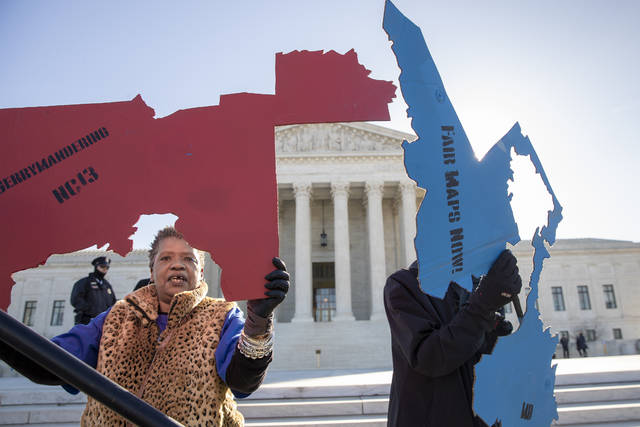High court questions courts’ role in partisan redistricting


WASHINGTON The Supreme Courts conservative majority sounded wary Tuesday of allowing federal judges to determine when electoral maps are too partisan, despite strong evidence that the political parties drew districts to guarantee congressional election outcomes.
WASHINGTON — The Supreme Court’s conservative majority sounded wary Tuesday of allowing federal judges to determine when electoral maps are too partisan, despite strong evidence that the political parties drew districts to guarantee congressional election outcomes.
The decisions in two cases the justices heard Tuesday, from Maryland and North Carolina, could help shape the makeup of Congress and state legislatures for the next decade in the new districts that will be created following the 2020 census.
In more than two hours of arguments over Republican-drawn congressional districts in North Carolina and a single congressional district drawn to benefit Democrats in Maryland, the justices on the right side of the court asked repeatedly whether unelected judges should police the partisan actions of elected officials.
“Why should we wade into this?” Justice Neil Gorusch asked.
Gorsuch and Justice Brett Kavanaugh pointed out that voters in some states and state courts in others are imposing limits on how far politicians can go in designing districts that maximize one party’s advantage.
Gorsuch said the court’s 2015 ruling upholding Arizona voters’ decision to take redistricting away from the legislature and create an independent commission shows there are other ways to handle the issue. That case was decided by a 5-4 vote before Gorsuch joined the court, with four conservatives in dissent.
In light of activity at the state level, Kavanaugh asked, “Have we really reached the moment, even though it would be a big lift for this court to get involved, where the other actors can’t do it?”
Chief Justice John Roberts, who last year worried about the harm to the court’s reputation if it had to pick political winners in endless redistricting disputes, suggested voters have a way of surprising people.
“Even…in the more recent cycle, I understand that a lot of things that were never supposed to happen happened,” Roberts said.
But there was no certainty that the justices would, in the end, shut courthouse doors to claims over excessive partisan gerrymandering, as the practice of designing districts for political gain is known.
Kavanaugh, in particular, said he would not dispute that “extreme partisan gerrymandering is a real problem for our democracy.”
Maryland residents Roberts and Kavanaugh also seemed troubled by majority Democrats’ efforts to flip a western Maryland seat that had been held by a Republican for 20 years to Democratic control. “I mean, it does seem that this is a situation where the state is taking retaliatory action against Republicans who were in that district,” Roberts said.
The cases at the high court mark the second time in consecutive terms the justices are trying to determine if they can set limits on partisan map-making. The court also could rule that federal judges should not oversee disputes over districts designed to benefit one political party.
Last year, the court essentially punted on cases from Wisconsin and the same Maryland congressional district that was before the court Tuesday.
Partisan gerrymandering is almost as old as the United States. While the court ruled 30 years ago that courts could police overly partisan map-making, the justices have never struck down districts on the ground that they violated the rights of voters from the minority party.
Supporters of limits on partisan redistricting say that it’s more urgent than ever for the court to intervene because partisan maps deepen stark political division in the United States and sophisticated computer programs allow map-makers to target voters on a house-by-house basis.
“The reputational risk of doing something is much, much less than the reputational risk of doing nothing, which will be read as a green light for this kind of discriminatory rhetoric and manipulation in redistricting from here on out,” said Allison Riggs, representing the League of Women Voters of North Carolina.
They were disappointed last year when Justice Anthony Kennedy, who was open to reining in maps drawn for partisan ends, didn’t join the court’s four more liberal justices.
Defenders of the maps that are being challenged want the court to defer to the other branches of government and bow out of partisan districting cases. Their chances may have been strengthened by Kennedy’s retirement.
Paul Clement, who represents North Carolina Republicans, asserted that it is perfectly acceptable for lawmakers to proclaim that they are drawing districts for partisan reasons. “I think actually being candid about it probably serves accountability principles in the long run,” Clement said.
Complaints about partisan gerrymandering almost always arise when one party controls the redistricting process and has the ability to maximize the seats it holds in a state legislature or its state’s congressional delegation.
That’s what happened in North Carolina, where Democrats hold only three of 13 congressional districts in a state that tends to have closely decided statewide elections.
Republicans drew congressional districts that packed Democratic voters into the three districts that translated into landslide victories. Meanwhile, the map produced smaller winning margins for Republican candidates, but in more districts.
Lower courts in both states struck down the districts as unconstitutionally partisan.
Decisions in Rucho v. Common Cause, 18-422, and Lamone v. Benisek, 18-726, are expected by late June.


